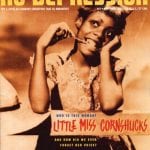Ray Wylie Hubbard – Outlaw blues
They say there’s two kinds of people in the world:
The day people and the night people
And it’s the night people’s job to get the day people’s money.
— “Nighttime”
“Hey, hippie, why don’t you get a job?”
Ray Wylie Hubbard paused in the crosswalk and peered out from under a tousled mare’s-nest of hair, searching for the sound of the vaguely familiar voice. “I’m tryin’,” he said as he spotted his inquisitor, a journalist who had coincidentally pulled up to the light as Hubbard was crossing Fifth Street in downtown Austin.
Hubbard did, in fact, have a job. He was preparing to go onstage at Antone’s as part of the Americana Music Association’s Thursday night South By Southwest showcase. But first he had to get a clean shirt. Which meant he had to go to the garage across from Antone’s and change into his gig clothes beside his car. Well into his fourth decade as a performer, and Hubbard was using a parking garage as a dressing room.
If I had some black cat’s bones
I’d take the things down to Antone’s
— “Knives Of Spain”
A short time later, he was onstage with guitarist Gurf Morlix and the rest of his ensemble. Hubbard was premiering new material from his new album, Growl (released in April on Rounder Records), and Morlix was particularly pivotal to the proceedings — he produced the record and was integral in shaping its dark and turbulent sound. Morlix’s name is a much-coveted credit in some circles, given his swampy, deep-dish guitar style and his previous production of much-lauded albums by Lucinda Williams and Robert Earl Keen.
For their second collaboration — the first was 2001’s Eternal And Lowdown — Morlix and Hubbard not only descended into the blues, but they seem to have delved beneath them into some sort of subterranean realm; the indigos, perhaps. The songs on Growl are as gritty and lowdown and elemental as its title suggests. The silvery razor of Hubbard’s bottleneck resonator slide guitar (a glittering counterpoint to his rumbling voice) flashes across a landscape that seems to have been crafted by Mississippi Fred McDowell and Flannery O’Connor working in tandem.
“We ain’t been nowhere at all since the Fairlane threw a rod,” Hubbard sings in “Purgatory Road”. “Whatever it is, is being damned to hell/By my Daddy and God.” The song ends with an extraordinary image of a blind boy playing guitar, oblivious to the desolation around him.
The same haunted figures wander in and out of different songs on the album: A preacher and a backporch skeptic re-enact the wrestling match between Saint Michael and the Devil; a father’s idea of bonding with his son is to take him to an all-night dice game; the rise and fall of a young band on the road concludes that all stars ultimately wind up fallen; a sinner, very far from heaven, dreams of an afterlife where horses run free and unfettered.
Then there’s “Screw You, We’re From Texas,” which bids to become an “Up Against The Wall, Redneck Mother” for the 21st century. A raucous singalong extolling the virtues of Lone Star musical chauvinism, the song nevertheless runs the risk being misinterpreted in the currently volatile political climate (one wag said the title sounded like George Bush addressing the United Nations).
Hubbard just shrugs. “The problem with irony is, not everyone gets it,” he says. “I wrote the song over a year ago, so it’s not like it’s a reaction to anything going on now. The way I was trying to write it was as if the Ramones were from Texas….If they want to burn my records in the other 49 states, well, first they’re gonna have to buy ’em.”
Hubbard knows all too well the perils of writing anthems. As a young, long-haired singer in Red River, New Mexico in the early ’70s, he dashed off the lyrics to “Up Against The Wall, Redneck Mother” after a bouffant-haired woman pinned him in a corner and asked just when, exactly, he was going to straighten up and fly right.++++++++++++++++++++++++++++++++++++++++
An excerpt of this article appeared in the The Best of No Depression: Writing About American Music, which features 25 of the finest articles from the magazines back issues, and was published in 2005 by University of Texas Press to help celebrate the magazines 10th anniversary. Due to our agreement with UT Press we are unable to include this article in our online archive.
The Best of No Depression is the only place you can find these articles other than our back issues. Visit the No Depression store to buy your copy for only $10.
The 300-page volume includes co-editor Grant Aldens award-winning 2001 feature on Billy Joe Shaver, co-editor Peter Blackstocks 1998 Artist of the Decade piece on Alejandro Escovedo, senior editor Bill Friskics-Warrens 2002 cover story on Johnny Cash, contributing editor Paul Cantins deep exploration of Yankee Hotel Foxtrot-era Wilco; and many other high points from our print heyday.
Table of contents for The Best of No Depression:
Preface, by Grant Alden and Peter Blackstock
Los Lobos, by Geoffrey Himes
Alejandro Escovedo, by Peter Blackstock
Jon Dee Graham, by Peter Blackstock
Billy Joe Shaver, by Grant Alden
Ray Wylie Hubbard, by John T. Davis
Flatlanders, by Don McLeese
Ray Price, by David Cantwell
Johnny Gimble, by Bill C. Malone
Johnny Cash, by Bill Friskics-Warren
Rosanne Cash, by Lloyd Sachs
Lucinda Williams, by Silas House
Buddy & Julie Miller, by Bill Friskics-Warren
Kasey Chambers, by Geoffrey Himes
Loretta Lynn, by Barry Mazor
Patty Loveless, by Bill Friskics-Warren
Kieran Kane, by Peter Cooper
Paul Burch, by Jim Ridley
Hazel Dickens, by Bill Friskics-Warren
Gillian Welch, by Grant Alden
Ryan Adams, by David Menconi
Jay Farrar, by Peter Blackstock
Jayhawks, by Erik Flannigan
Wilco, by Paul Cantin
Drive-By Truckers, by Grant Alden
Iron & Wine, by William Bowers




